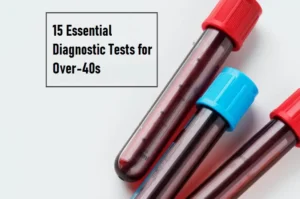
5 Tests Every Adult Should Get Before 40
Turning 40 may feel like just another birthday—but your body sees it differently.
Around this age, silent health changes can begin to take root. And while you may still feel great on the outside, what’s happening internally can set the tone for the next few decades.
That’s why getting the right medical tests before 40 isn’t just a good idea—it’s essential. These tests can catch potential issues early, when they’re easiest to treat (or even prevent altogether).
Here are 5 crucial tests every adult should get before blowing out those 40 candles.
Also check for : detox-your-body-the-safe-and-scientific-way
🩸 1. Comprehensive Blood Panel (Annual Physical)
Think of this as your health dashboard. A full blood panel offers insight into your body’s core systems—metabolism, liver function, kidneys, immune system, and more.
What it includes:
-
Complete blood count (CBC)
-
Lipid panel (cholesterol and triglycerides)
-
Blood glucose (fasting or A1C)
-
Liver and kidney function
-
Thyroid-stimulating hormone (TSH)
-
Vitamin D and B12 (optional but helpful)
Why it matters:
Early warning signs of diabetes, thyroid issues, nutrient deficiencies, and heart disease often show up here—before symptoms do.
🕒 How often?
Yearly or as recommended by your doctor
❤️ 2. Blood Pressure Screening
High blood pressure is called the “silent killer” for a reason. It usually has no symptoms—but it’s one of the leading causes of heart attacks, strokes, and kidney disease.
Why it matters:
1 in 3 adults has high blood pressure—and many don’t know it. Catching it early allows for simple lifestyle changes (and medication if needed) to protect your heart and brain.
🕒 How often?
At least once every 1–2 years, more often if elevated
📍Pro Tip: Ask your doctor for your exact numbers, not just “normal” or “high.”
🩺 3. Cholesterol and Lipid Profile
This test measures the fats in your blood, including:
-
LDL (bad) cholesterol
-
HDL (good) cholesterol
-
Triglycerides
Why it matters:
High LDL and triglycerides increase your risk of atherosclerosis—a buildup of plaque in your arteries that can lead to heart disease.
This risk starts climbing in your 30s, especially if you have a family history, smoke, or are inactive.
🕒 How often?
Every 4–6 years (sooner if levels are high or you’re at risk)
🧬 4. Blood Sugar Test (Fasting Glucose or A1C)
With rising rates of type 2 diabetes (even among young adults), this test is non-negotiable.
Why it matters:
You could be prediabetic and not know it—meaning your blood sugar is elevated but not yet high enough for a diabetes diagnosis. Prediabetes is 100% reversible with the right changes—if caught early.
🕒 How often?
At least once by age 40, more if overweight, have PCOS, or a family history of diabetes
📍Best test? Ask for A1C—it shows your average blood sugar over 3 months.
🧴 5. Cancer Screenings (Age & Gender Specific)
Not all cancer screenings start at 40, but depending on your personal and family history, some may be needed earlier.
Here are a few to consider before 40:
For Women:
-
Pap smear (every 3 years starting at 21)
-
HPV test (co-tested with Pap after 30)
-
Clinical breast exam (at least every 3 years)
-
Consider early mammograms if family history is strong
For Men:
-
Testicular exam (especially in 20s and 30s)
-
Prostate screening (if family history or symptoms)
For All:
-
Skin check by a dermatologist (especially if you have many moles or sun exposure)
-
Colonoscopy starting at age 45—but earlier if family history of colon cancer
🕒 How often?
Based on personal risk and doctor recommendations
Bonus Tests to Consider:
While the top 5 are essential, these additional screenings can also be valuable before 40:
-
Eye exam – even if you don’t wear glasses
-
Hearing test – especially with frequent noise exposure
-
Dental checkup – oral health links to heart disease
-
Mental health screening – anxiety and depression can peak in midlife
-
STD/STI testing – based on lifestyle and risk factors
Final Thoughts: Prevention is Power
Health issues don’t wait for your 40th birthday—and many have no early symptoms. Getting tested isn’t just about fear; it’s about freedom—the freedom to take action, stay ahead, and live fully.
Remember:
🩺 Testing is not a diagnosis—it’s a tool for awareness.
You don’t have to wait for something to go wrong. Be proactive, not reactive.
Because the best gift you can give yourself before 40?
Knowledge—and the power to protect your health.
